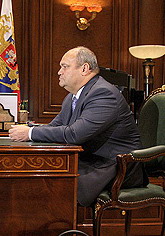Earlier this month, Russia's Penza Governor Vasily Bochkarev announced [ru] that he wants to “reject formal appointment procedures” in restaffing his ombudsman on investors’ and entrepreneurs’ rights. His Chief of Staff, Viktor Rubtsov, soon introduced [ru] a “pilot program” to use an online election to nominate a candidate for the vacancy. (The winner would not automatically gain the position, but be considered for the job.)
The Governor's office designated local web portal Penzenskaia Pravda as the virtual platform for the election, scheduling the vote to end on August 9. Though it is no longer the case [ru], local entrepreneur and blogger Anton Kupriushin led the race for over a week, surprising some and worrying others about the prospects for online voting.

Vasily Bochkarev, 4 August 2009, photo by the Russia President's Press Service, CC BY-SA 3.0; Wikimedia Commons.
Bochkarev's state experiment with online methods complements recent parallel attempts by the opposition to exploit the growing but still poorly utilized powers of virtual primaries. To date, one of the most prominent online primaries was held in Omsk, where Ilya Varlamov won an online vote and later withdrew from the mayoral race, without ever actually registering as an official candidate.
Despite this failure, there is an enduring interest in harnessing the direct democracy potential of online voting, and Penza's government is apparently hoping to make some progress in this field.
Penza officials’ interest in its netizens predates the political turmoil that has permeated Russia since last December's parliamentary elections. Indeed, more than a year earlier, in November 2010, Governor Bochkarev responded to President Medvedev's blogging initiative and ordered [ru] Penza bureaucrats to start their own blogs. (This order apparently went largely unheeded.)
In April 2011, the Governor then met with a dozen of the region's best known bloggers for an open discussion about various local issues that ranged from stray dogs (Bochkarev wants to create an NGO to manage the issue) to replacing Penza's mayor, Roman Chernov (which the Governor claimed was beyond his authority).
Since that first meeting more than a year ago, Penza's netizens and state officials have cautiously courted one another. The Governor has met with bloggers several more times, leading some to distrust the government's heightened interest in them, though the benefits of improved access to power are not lost on everyone.
Kupriushin, the blogger who initially led the online vote, is a case in point. After his latest sit-down with the Governor earlier this month, he swore [ru] never to attend another such meeting, criticizing the fact that members of “Stal” (an offshoot of the pro-Kremlin youth group Nashi) were also invited:
Да и встречаться больше не будем, так решили. Пусть теперь сладенькие встречаются, нашисты, стальевцы, а мы не станем.
Local blogger Evgeny Makeenko has also employed the “Nashist” slur, complaining [ru] that Penzenskaia Pravda is a “Nashist newspaper.” (Makeenko's issues with the publication seem to stem [ru] from it having deleted his comments attacking Penza businessman Oleg Totskii, whose bodyguard died and family was hospitalized after carbon monoxide [ru] accidentally poisoned his home last February.)
Also fearing manipulation, Kupriushin worried [ru] that the meetings were designed to tame Penza's bloggers:
Не пойду я на эту встречу и на последующие тоже не пойду. Никому они особо не нужны. Кроме рейтингов. Информациооной открытости.
In comments to the newspaper Kommersant, Kupriushin also expressed [ru] pessimism about the virtual election for the investment/entrepreneurs ombudsman, arguing that an open online election overlooks the specific interests of the business community, and is vulnerable to meddling by the authorities:
Такой отбор совершенно не отражает мнения предпринимателей [….] Видимо, сказывается веяние федерального центра, когда федеральный инвестиционный омбудсмен заявил о том, что в регионах на такие должности людей надо выбирать, а не назначать. Но, я думаю, что в итоге все равно накрутят голосов нужному кандидату.
Kupriushin, however, is not always so gloomy about the Governor's engagement with local bloggers. Whatever his issues with “federal trends” and possible disservice to the business community, he has actively promoted his ombudsman candidacy on his blog. Kupriushin has also paused to celebrate Bochkarev's interest in online citizen initiatives.
On July 23, for instance, he commented [ru] on the Governor's LiveJournal page in order to promote [ru] a nationwide trash cleanup on September 8, organized by the group “Blogger Against Trash” [ru] (founded [ru] in 2011 by photographer and ultra-popular blogger Sergei Dolya). Kupriushin led the group's trash collection effort last year in Penza, and this year he asked Bochkarev to participate and bring along the local media. To Kupriushin's surprise, the Governor agreed.
While both Bochkarev's administration and Penza's bloggers remain suspicious about each other, the rewards of cooperation (or even, at the very least, purely symbolic contact) keep the two in dialogue. According [ru] to Vladimir Volkov (the region's agriculture minister), the experiment with online voting is an effort to ‘stay ahead of the curve,’ anticipating the expansion of elections for such positions, as federal initiatives impose new rules on regional politics.
Volkov was rationalizing only the state's behavior, but these survival instincts clearly are not limited to the government. Bloggers, too, are trying to play it safe, without limiting their options in a country with an uncertain future.








